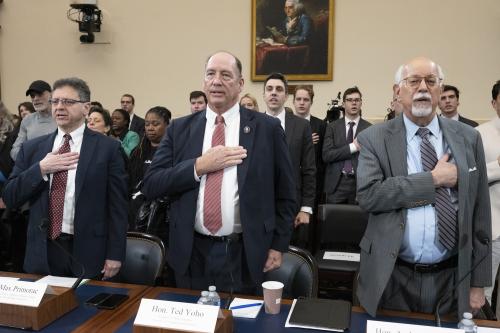Marijuana policy is changing the way Congress thinks and acts. Like most new areas of policy—or policies new to Congress—it is not happening through a ground-breaking, fast moving, all-encompassing policy shift. Instead, through small steps—small victories for marijuana supporters—Congress is showing signs of change, at least in regard to medical marijuana, that depart dramatically with the institution’s historical support for the war on drugs.
Last week, a committee vote in the U.S. Senate paved the way to relax policies regarding medical marijuana in veterans’ health facilities. Long an issue championed by veterans groups and the pro-marijuana community, the desire to facilitate veterans’ access has increased as this group’s health issues gain greater national attention in the wake of two wars. The advocacy communities argue that medical marijuana can be used to treat or manage the symptoms of a variety of ailments that disproportionately affect veterans, including chronic pain, anxiety and PTSD. They also suggest cannabis can be helpful in addressing the serious epidemic of veteran suicide.
I take no position on the efficacy of such a treatment—I’ll leave those determinations to the medical and other scientific communities. But regardless of one’s perspective around or belief in those claims, the argument has motivated a serious change among policy communities and now policymakers.
One stumbling block in the effort to give veterans access to medical marijuana has been legal restrictions on VA doctors’ ability to recommend cannabis for treatment. In fact, VA doctors are often unwilling to discuss the topic with patients who have questions. This reality comes not from heartlessness among VA professions. Nor does this barrier arise necessarily because of a cultural opposition among VA doctors. Instead, federal law, particularly the Controlled Substances Act (CSA) and the regulatory progeny that traces its roots back to that act, limits the ability of doctors (federal government employees) to recommend a substance that is determined to be illegal.
This presents a real challenge for medical marijuana-seeking veterans. Many veterans depend solely or largely on VA for their health care access. Wounded warriors also face risks of economic hardship because of their disability or health conditions that limit employment. Thus, the added costs of seeking out a non-VA doctor for a recommendation adds to the price of accessing medical marijuana—a product that is already quite costly in many jurisdictions.
In response, a bipartisan amendment was proposed by Senators Steve Daines (R-Mont.) and Jeff Merkley (D-Ore.) that sought to overcome that challenge.
Details about the veteran’s medical marijuana proposal
First, a few clarifying points about what this proposal is and what it is not. It is not a stand-alone law. It is a committee amendment to the Senate version of the FY16 Military Construction and Veterans Affairs Appropriations bill. While elements of this proposal can be found in the recent comprehensive legislation (the CARERS Act), this proposal is not the formal advancement of that legislation.
Nor has the Senate passed this proposal. Its advancement thus far has been in the appropriations subcommittee on two votes. The first passed the amendment entering it formally into the legislation. The second passed the broader appropriations bill through committee. That is not to say the legislation is not significant. This is one of the first times a Senate committee passed an individual legislative item specifically relaxing marijuana policy. (Previous Senate votes on broader bills included pro-marijuana provisions, taken up and inserted by the House.)
Second, the legislative effort is not certain to find its way into the final bill. The Senate committee bill (the broader appropriations legislation) differs from the House version, and thus, one of two paths forward on the legislation must occur. Either the House has to pass the Senate version or the House and Senate need to conference to work out differences—a scenario in which this provision, like all others, are at risk of being stripped. That is not to say this provision will ultimately be left out, but the reality is that this is not a done deal.
Third, it is unclear what effect the provision will have. The amendment attempts a policy change via its formal jurisdiction: appropriations. As the committee report on the legislation notes, the effect of the amendment is to prohibit “the use of funds to interfere with the ability of veterans to participate in State-approved medicinal marijuana programs or deny services to such veterans” (see p. 71). There exist two challenges to this provision having the intended effect. For one, the Obama administration took a combative stance against a similar provision in a Justice Department appropriations bill that sought to restrict the use of DEA funds to enforce the CSA in states with approved medical marijuana systems. Rather than compliance with that legislation, a DEA spokesperson noted that the administration position is that it can still use funds to enforce the CSA, even in states covered by that provision. The administration position that gives the CSA supremacy over the provisions of appropriations legislation sets a precedent (or at least offers a precedent) that calls into question whether the veterans access provision would be treated similarly.
That said, in an environment in which the VA is mired in scandal and simultaneously veteran health issues are quickly rising in public awareness, it is hard to imagine the Obama administration arresting veterans and VA doctors seeking such treatments. Veterans’ health care policy should never be determined by political optics; in fact the political optics of such prosecutions would be devastating for the administration and fodder for some of the most damning media coverage a White House could imagine.
Yet, beyond the White House’s determination of the binding nature of the appropriations provision, it is important to consider another limitation. The provision does not force doctors to discuss marijuana. Nor does it force doctors to consider marijuana as a treatment option. It simply seeks to offer a type of legal protection for doctors who choose to offer cannabis as part of a treatment regimen. “Choose” is the key word because doctors can still opt, for whatever reason, not to consider such a treatment plan. While some medical professionals have a very accepting view of medical marijuana, others remain opposed. Some physicians are not convinced of the medical benefit or are uncomfortable with the scant research on the topic. Other physicians may remain concerned about legal ramifications. Still others operate within a medical culture in which some constituencies remain opposed to cannabis for a variety of reasons. The result is that even if reform comes about, veterans’ access to medical marijuana will still face serious barriers—formal and informal—in ways that will come as no surprise to those in the pro-marijuana community. Those barriers are ones that the movement works hard to break down, but they are barriers that still exist and remain firm in specific segments of society.
Regardless of the outcome of the Daines-Merkley amendment and of the ultimate consequence of the policy change, the passage of this legislation tells us something significant about the trajectory of marijuana policy in the United States. The grip of the war on drugs on American political institutions is weakening. Legislators are likely responding to a combination of rapidly changing and concrete public opinion and a coordinated, professionalized lobbying effort. Congress members and Senators no longer see marijuana policy as a hot button issue mired in the culture wars of American politics. Instead, (medical) marijuana is a health care issue that is being debated in the halls of Congress, not as a taboo but as mainstream public policy. Congress keeps signaling its transformation on this issue and the Daines-Merkley amendment’s greater significance may be the sign that this transformation may finally have broken down the doors to the Senate chamber.
The Brookings Institution is committed to quality, independence, and impact.
We are supported by a diverse array of funders. In line with our values and policies, each Brookings publication represents the sole views of its author(s).



Commentary
Veterans, medical marijuana, and the United States Senate
May 27, 2015